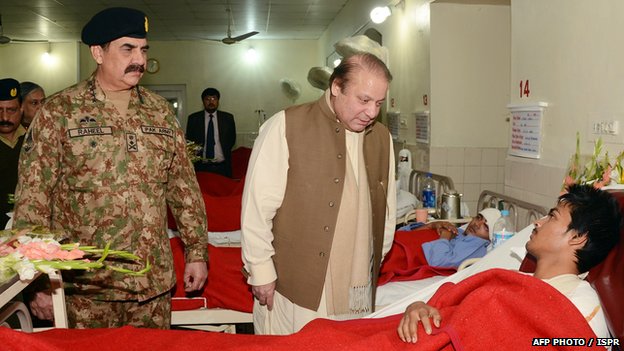 Islamabad: But the brutal Taliban attack on an army-run school in Peshawar which killed more than 130 children may well be a watershed for a country that has long been accused by the world of treating terrorists as strategic assets.
Islamabad: But the brutal Taliban attack on an army-run school in Peshawar which killed more than 130 children may well be a watershed for a country that has long been accused by the world of treating terrorists as strategic assets.
The day after the attack, as a nation mourned and Peshawar buried its dead, Pakistan’s top political leadership announced that it was no longer willing to make any distinction between “good” and “bad” Taliban. Flanked by his arch rivals and allies, Pakistan’s Prime Minister Nawaz Sharif vowed to carry on fighting until the last terrorist was killed.
As he was making the announcement, Pakistan’s army chief General Raheel Sharif was meeting Afghan President Ashraf Ghani and International Security Assistance Force (Isaf) commanders in Kabul to seek their assistance in fighting a menace which he said had “hit the heart of the Pakistani nation”.
Could this, then, be the watershed Pakistan has been in search of for years?
The answer probably lies in the prime minister’s statement, which is not only about a new intent but also about an admission: for years Pakistan has pursued a duplicitous policy towards various shades of militant organisations operating out of its territory.
Simply put, those active against Isaf in Afghanistan or against Indian security forces across the Line of Control in Kashmir were the “good” Taliban. But those who had affiliated themselves to al-Qaeda after 9/11 and carried out terror attacks inside Pakistan were the “bad” ones.
The problem, of course, was this distinction was never as clear in Taliban minds as it was in Pakistan’s policy makers’. Often co-operating organisationally and operationally, the continuously splintering Taliban groups continued to benefit from the fruits of Pakistan’s policy confusion. In the process, they consolidated their bases in the country’s lawless tribal belt unchecked.
The inaction of General Kayani, Raheel Sharif’s predecessor, was an additional bonus for the Taliban. In his six-year tenure, he came under strong criticism for failing to devise an effective counter terrorism approach even after the government gave him complete authority to do so.
Consequently, every fresh Taliban attack on soldiers steadily raised the disquiet and resentment within military ranks – not only against the government but also its own leadership.
That was why Gen Sharif lost no time in launching what he called an indiscriminate operation earlier in the year in North and South Waziristan, the two tribal agencies most under Taliban control.
But still mired in their policy confusion, Pakistan’s political leadership’s response to his initiative was lukewarm. Gen Sharif categorically said “we will get them”, be they Pakistani Taliban, Punjabi Taliban, al-Qaeda and affiliates, or most importantly, the dreaded Haqqani network. But the country’s political leadership chose to remain largely silent.
The Peshawar attack seems to have changed that.
Sheer brutality
In the short term, the Taliban may have got what they wanted. They were able to hit the army where it hurts the most. The 128 army-run schools in the country are home to more than 150,000 students, 90% of them are children of serving army officers.
The attack has brought the fight home to the army in its most horrific form.
The militants have also demonstrated that despite the army’s claims of having destroyed their operational and organisational capability, they are present and still capable of planning and hitting at will, where they want.
A bonus of course has been the media spectacle that has gone beyond Pakistan’s borders.
But in doing so, they have also brought home the sheer brutality of this conflict.
Behind every student they killed in Peshawar, lurked their anger and frustration at what many among them must perceive as an about-turn by a former sympathiser, if not exactly an ally.
For the Taliban, the attack was an act of pure revenge. There doesn’t seem to be any strategic or political thinking behind it other than their known philosophy of ruling through terror. It seems to matter little to them that it may have pushed Pakistan’s civil and military leadership into rethinking its good-Taliban-bad-Taliban approach.
More important for Gen Sharif, though, is the fact that if there was any measure of sympathy for the Taliban within the army, which was their chief mentor only a decade ago, it must have been washed away in the tears of hundreds of grieving military families across Pakistan.
Does it then mean that the real war on terror has finally started in Pakistan?
It is far too early to venture a credible guess given the historic complexity of Pakistan’s relationship with the Taliban.
But what is clear is that Pakistan is now looking for visible and demonstrable revenge – which may perhaps come only from a trade-off with Afghanistan on each other’s “good” and “bad” Taliban.
In a country with a 35-year history of rearing militant groups for its strategic objectives, perhaps that is as far as a watershed can go. At least for now.

